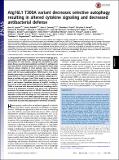| dc.contributor.author | Lassen, Kara G. | |
| dc.contributor.author | Kuballa, Petric | |
| dc.contributor.author | Conway, Kara L. | |
| dc.contributor.author | Patel, Khushbu | |
| dc.contributor.author | Becker, Christine E. | |
| dc.contributor.author | Peloquin, Joanna M. | |
| dc.contributor.author | Villablanca, Eduardo J. | |
| dc.contributor.author | Norman, Jason M. | |
| dc.contributor.author | Liu, Ta-Chung | |
| dc.contributor.author | Heath, Robert J. W. | |
| dc.contributor.author | Becker, Morgan L. | |
| dc.contributor.author | Fagbami, Lola | |
| dc.contributor.author | Horn, Heiko | |
| dc.contributor.author | Mercer, Johnathan | |
| dc.contributor.author | Yilmaz, Omer | |
| dc.contributor.author | Jaffe, Jacob D. | |
| dc.contributor.author | Shamji, Alykhan F. | |
| dc.contributor.author | Bahn, Atul K. | |
| dc.contributor.author | Carr, Steven A. | |
| dc.contributor.author | Daly, Mark J. | |
| dc.contributor.author | Virgin, Herbert W. | |
| dc.contributor.author | Schreiber, Stuart L. | |
| dc.contributor.author | Stappenbeck, Thaddeus S. | |
| dc.contributor.author | Xavier, Ramnik J. | |
| dc.date.accessioned | 2014-12-02T18:42:05Z | |
| dc.date.available | 2014-12-02T18:42:05Z | |
| dc.date.issued | 2014-05 | |
| dc.identifier.issn | 0027-8424 | |
| dc.identifier.issn | 1091-6490 | |
| dc.identifier.uri | http://hdl.handle.net/1721.1/91990 | |
| dc.description.abstract | A coding polymorphism (Thr300Ala) in the essential autophagy gene, autophagy related 16-like 1 (ATG16L1), confers increased risk for the development of Crohn disease, although the mechanisms by which single disease-associated polymorphisms contribute to pathogenesis have been difficult to dissect given that environmental factors likely influence disease initiation in these patients. Here we introduce a knock-in mouse model expressing the Atg16L1 T300A variant. Consistent with the human polymorphism, T300A knock-in mice do not develop spontaneous intestinal inflammation, but exhibit morphological defects in Paneth and goblet cells. Selective autophagy is reduced in multiple cell types from T300A knock-in mice compared with WT mice. The T300A polymorphism significantly increases caspase 3- and caspase 7-mediated cleavage of Atg16L1, resulting in lower levels of full-length Atg16Ll T300A protein. Moreover, Atg16L1 T300A is associated with decreased antibacterial autophagy and increased IL-1β production in primary cells and in vivo. Quantitative proteomics for protein interactors of ATG16L1 identified previously unknown nonoverlapping sets of proteins involved in ATG16L1-dependent antibacterial autophagy or IL-1β production. These findings demonstrate how the T300A polymorphism leads to cell type- and pathway-specific disruptions of selective autophagy and suggest a mechanism by which this polymorphism contributes to disease. | en_US |
| dc.description.sponsorship | Crohn's and Colitis Foundation of America (Genetics Initiative) | en_US |
| dc.description.sponsorship | Leona M. and Harry B. Helmsley Charitable Trust | en_US |
| dc.description.sponsorship | National Institutes of Health (U.S.) (Grant DK097485) | en_US |
| dc.description.sponsorship | National Institutes of Health (U.S.) (Grant DK043351) | en_US |
| dc.description.sponsorship | Deutsche Forschungsgemeinschaft (Fellowship Award KU2511/1-1) | en_US |
| dc.description.sponsorship | National Institutes of Health (U.S.) (Grant AI084887) | en_US |
| dc.language.iso | en_US | |
| dc.publisher | National Academy of Sciences (U.S.) | en_US |
| dc.relation.isversionof | http://dx.doi.org/10.1073/pnas.1407001111 | en_US |
| dc.rights | Article is made available in accordance with the publisher's policy and may be subject to US copyright law. Please refer to the publisher's site for terms of use. | en_US |
| dc.source | National Academy of Sciences (U.S.) | en_US |
| dc.title | Atg16L1 T300A variant decreases selective autophagy resulting in altered cytokine signaling and decreased antibacterial defense | en_US |
| dc.type | Article | en_US |
| dc.identifier.citation | Lassen, K. G., P. Kuballa, K. L. Conway, K. K. Patel, C. E. Becker, J. M. Peloquin, E. J. Villablanca, et al. “Atg16L1 T300A Variant Decreases Selective Autophagy Resulting in Altered Cytokine Signaling and Decreased Antibacterial Defense.” Proceedings of the National Academy of Sciences 111, no. 21 (May 12, 2014): 7741–7746. | en_US |
| dc.contributor.department | Koch Institute for Integrative Cancer Research at MIT | en_US |
| dc.contributor.mitauthor | Yilmaz, Omer | en_US |
| dc.relation.journal | Proceedings of the National Academy of Sciences | en_US |
| dc.eprint.version | Final published version | en_US |
| dc.type.uri | http://purl.org/eprint/type/JournalArticle | en_US |
| eprint.status | http://purl.org/eprint/status/PeerReviewed | en_US |
| dspace.orderedauthors | Lassen, K. G.; Kuballa, P.; Conway, K. L.; Patel, K. K.; Becker, C. E.; Peloquin, J. M.; Villablanca, E. J.; Norman, J. M.; Liu, T.-C.; Heath, R. J.; Becker, M. L.; Fagbami, L.; Horn, H.; Mercer, J.; Yilmaz, O. H.; Jaffe, J. D.; Shamji, A. F.; Bhan, A. K.; Carr, S. A.; Daly, M. J.; Virgin, H. W.; Schreiber, S. L.; Stappenbeck, T. S.; Xavier, R. J. | en_US |
| dc.identifier.orcid | https://orcid.org/0000-0002-7577-4612 | |
| mit.license | PUBLISHER_POLICY | en_US |
| mit.metadata.status | Complete | |
